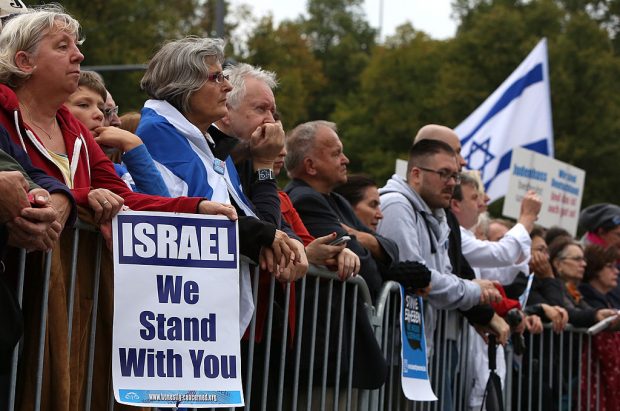 In a screening interview for a government job I was once asked about my religion. I said I was Jewish but not very religious; I was secular. I was then asked about how I feel about the State of Israel, which I immigrated from to Australia in 1999 as a child. I replied saying I loved Israel; it is a place of great meaning to me. It is a place that gave my family and I shelter and acceptance when we escaped Communist Russia. I also added that I feel a similar affinity for Australia, although in a different context.
In a screening interview for a government job I was once asked about my religion. I said I was Jewish but not very religious; I was secular. I was then asked about how I feel about the State of Israel, which I immigrated from to Australia in 1999 as a child. I replied saying I loved Israel; it is a place of great meaning to me. It is a place that gave my family and I shelter and acceptance when we escaped Communist Russia. I also added that I feel a similar affinity for Australia, although in a different context.
I assumed this would be the end of the conversation. I assumed that the majority of the population was aware of the unique relationship and bond that Jewish people share with the State of Israel. It cannot be severed by distance because generations of Jewish ancestry bind us to this land and the people in it. Our instinct is to protect Israel, as it is representative of what we have suffered as a people and how we have overcome.
Yet several weeks later I underwent a follow-up interview where I was asked to clarify how it is that I can love Israel, but not be religious. I paused for a moment, bewildered, then retorted condescendingly, “Do you need to be a member of the Church of England to love England?”
Apparently, this information did not correlate with the interviewer’s – and the agency’s – beliefs. They intimated that from their perspective, admiration for the State of Israel required a largely religious context. They misunderstood what it means to be Jewish. I was offended and appalled that my religion, secularism and dedication to the State of Israel were all being questioned and misinterpreted simultaneously.
More recently, I was asked – belligerently – why I take the Israeli-Palestinian conflict so seriously when I am an Australian citizen residing in peaceful Melbourne. There was a presumption that events occurring on the other side of the world should not impact my perspective. I am often told by such meddlesome bystanders to “just get over” the Jewish problem. Bystanders lament that if we all “just get over” it, then the Jewish people will cease to be a prominent target within media and global affairs. But ridding ourselves of the wrath of the United Nations – which has condemned Israel more times than it has all other countries combined – is not as simple as that.
Yesterday, a friend told me that anti-Semitism was not a legitimate cause of worry and she was “not buying it”. I daresay that she would not have made a similar quip pertaining to homophobia. Do we deny homophobia just because we personally have not experienced it? No. Do we deny the heartfelt connection that African Americans have to their ancestors who were enslaved by the Confederacy? Do we deny them their grievances? No, we dare not and nor should we.
Yet somehow, diminishing the grievances experienced by Jewish people is considered appropriate dinnertime conversation. Genteel anti-Semitism, believed by some to be a relic of the past, has now returned in all its glory sanctioned by a movement that legitimises it by denying its existence.
Such platitudes are frequent and indeed are espoused with the intention of preventing ‘foreign’ animosities from plaguing the hearts and minds of Jewish Australians. Essentially, some kind souls are convinced that we as a people should not hold onto bitter memories and experiences from our past and in the contemporary Middle East. This attitude is not endemic solely to the left. It is commonplace among people from all sides of the political sphere and is a consequence of either lack of historic knowledge or, quite simply, viewing Jews as a people far more privileged than they are in reality.
Evidently, there is a plethora of people in Australia who do not fully comprehend the monumental importance of the State of Israel to the Jewish people. We are now one tribe formed from the twelve tribes of Israel. A tribe with a long history of persecution and blame attribution. These experiences have compounded our sense of community and togetherness. They have instilled in us an instinct to protect the tribe. Israel is the first place we have had in our ancient history where no one can ever try to prevent us from practising our faith.
Our people were expelled from Spain 500 years ago. We were demonised as the killers of Christ. We did not possess property ownership rights or possess citizenship in much of Europe. In the Ukraine, Poland and Russia in the nineteenth and early twentieth centuries we were restricted to living in Jewish-only areas and often subjected to violent mass riots; the pogroms. We were attacked, admonished, treated differently and locals were suspicious of us, often with government encouragement. I will not describe in detail what happened to us in the middle of the twentieth century because I am certain most readers are already aware.
Perhaps because it is no longer the Western world that most significantly incites anti-Semitism – this prized claim has moved to be dominated by the Middle East – its citizens have become forgetful about their personal history with it. German guilt, it seems, has replaced the need for other Europeans to acknowledge the history of a millennia of discrimination, suspicion and segregation of the Jewish people.
Hitler’s greatest achievement for the West was to assuage guilt rightly belonging to all of Europe, and instead concentrating the guilt on Germany alone. As the rest of Europe breathed a sigh of relief at being absolved of their sins, the Jewish people were finally given the British Mandate for Palestine to establish a Zionist homeland. The Jews and Europeans were now equal, all was forgiven.
As things stand today, anti-Jewish teachings and propaganda are circulated widely around the Middle East and North Africa. A 2014 Anti-Defamation League global survey shows the highest results of anti-Jewish sentiments in Palestinian territories of the West Bank and Gaza – 93 per cent hold anti-Jewish views), Iraq (92 per cent), Yemen (88 per cent), Algeria and Libya (87 per cent), Tunisia (86 per cent), Kuwait (82 per cent), Bahrain (81 per cent), Jordan (81 per cent), Morocco, UAE and Qatar (80 per cent) and so on.
I won’t speculate on the complex history of Islamic-Jewish relations, which have not always been this chaotic. It is sufficient to state that aggression towards the Jewish people and Israel is unquestionably prevalent. The contemporary wave of negative affect seems to emanate significantly from the dissatisfaction with the existence of the State of Israel and solidarity with Palestine.
In Europe, Jews have embarked on an exodus to Israel due to fears of attack and intimidation, spurred by Islamic immigration and a once latent, now burgeoning, anti-Semitism. A renewed sense of having to hide the Jewish identity has arisen, exacerbated by the prevalence of Islamic terror attacks.
French Jews represent only one per cent of the population – just some 475,000 – yet 51 per cent of recorded hate-crime was directed towards them. Consequently, in 2015 an exorbitant number of 8,000 French Jews made Aliyah to the State of Israel (an 88 per cent increase from 2013). Similarly, it is estimated that 7,500 left Ukraine for Israel.
These patterns of migration are not imaginary, nor are they reactionary. They are happening because Jewish citizens of Europe are afraid of once again becoming a target. They are leaving before they are forced out.
After centuries of persecution – and in the wake of more recent events – our tribe has adopted a defensive mentality consecrated within the State of Israel. We have learned to be afraid of those who would hurt us. This is a logical fear based in history and fact.
Many Western Jews seem to have adopted the approach of ‘forgive and forget’. They know what our people were subjected to but they hang onto the belief that those events will never happen again. Against all odds, they cling to the belief that history, for once, will not repeat itself.
However, history is not malleable. History does, and will, repeat itself. Segregation in the United States was believed to be a thing of the past. Yet, it has reared its ugly head again. It is now acceptable for students who identify as people of colour in universities to segregate themselves on campus in order to obtain a ‘safe space’.
History is repeating itself in a way many of us believed would never occur, because we believed that mankind had learned its lesson and was ready to live in peace. But humans are fallible creatures and war always has its victors.
Oftentimes fashionable social justice warriors raise cries of ‘racism’ when Jewish people express apprehension at the idea of living in an area with a significant population of Muslims. Islamophobia is the cause du jour. But considering the history of the Jewish experience, is it racism to be afraid? Is it racism to be cautious? Perhaps those whose people have not known a thousand years of violence and oppression should empathise, understanding that not all fear is baseless. Perhaps those whose people have historically been the oppressors should pause before judging the reaction of the oppressed.
As Australia opens its borders to refugees and immigrants from Muslim nations, is it racist for a Jew like me to be apprehensive about areas with large Muslim populations? I know that Australia is a safe, welcoming society; but I also know my history.
Got something to add? Join the discussion and comment below.
Get 10 issues for just $10
Subscribe to The Spectator Australia today for the next 10 magazine issues, plus full online access, for just $10.

























Comments
Don't miss out
Join the conversation with other Spectator Australia readers. Subscribe to leave a comment.
SUBSCRIBEAlready a subscriber? Log in